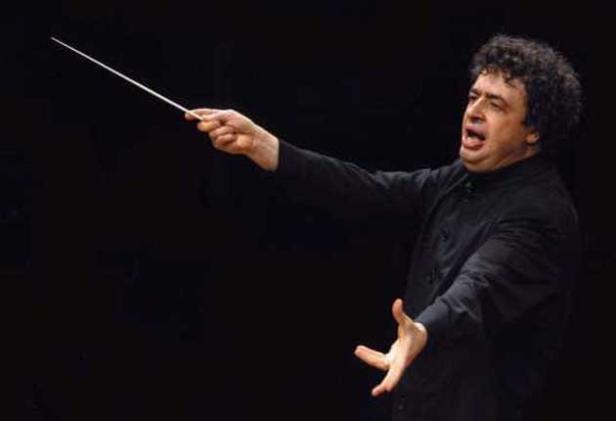An underrated “Manfred” outshines a forgotten Bruch in Bychkov’s CSO turn
It’s not often that the seasoned music lover can indulge a sense of discovery with a work by an established composer, long deceased. But conductor Semyon Bychkov provided that service Thursday at Symphony Center in a guest appearance with the Chicago Symphony Orchestra that was eminently forgettable for one half and deeply memorable in the other.
Max Bruch’s fame rests today on Kol nidrei, the G minor violin concerto, and the Scottish Fantasy, three works with string soloists that are beloved for their melodic invention and idiomatic grasp of their respective protagonists. Among his many forgotten works is the Concerto for Two Pianos, a unfortunate creation with a uniquely convoluted history.
Commissioned (and subsequently re-written) by the sisters Rose and Ottilie Sutro, both the original and butchered versions of the concerto were quite literally stuffed in a drawer and forgotten after the premiere of the rewrite by Leopold Stokowski and the Philadelphia Orchestra in 1916. Bruch’s actual work received its belated premiere in 1974 after protracted legal copyright scuffles, but its discovery hardly set the music world on fire. The performance Thursday was the first ever by the CSO, and it would be no great tragedy if the orchestra waited another half century for a second look.
It was another pair of siblings, the esteemed Katia and Marielle Labéque, who came to this concert with a mission to resuscitate this sad creation. One can’t quibble about the sincerity and effort behind their advocacy, or that of Bychkov, save his questionable decision to halve the string sections for this full-blooded romantic score.
One might consider the sluggish counterpoint in the first movement to be a daring stroke from a composer not known for innovation, but more likely it is an awkward holdover from his earlier Suite for Organ and Orchestra on which this concerto was based. The concerto finally springs to life in the second movement, with virtuosic piano flourishes reminiscent of the finales of Mendelssohn and Saint-Saëns. The sisters ripped through the score with aplomb, showing few signs of discomfort with the acute technical hurdles that prompted wholesale re-writes from the Sutro sisters.
Bychkov and soloists sculpted the third movement tunes with loving care, barely skirting the overwrought melodrama lurking just below the surface. But nothing could save the finale, a bizarre conflagration of slow-paced, majestic pronouncements in the orchestra with blazing pyrotechnics in the twin concert grands. The vacuous note-spinning continued with an encore of the finale of Philip Glass’ Four Movements for Two Pianos.
Tchaikovsky’s “Manfred” Symphony has never reached the lofty popularity of his other late symphonies. Critics rightly note its unwieldy bloat and formal inelegance, but unfairly place the blame on his use of an explicit program, despite his reliance on literary inspiration for many of his finest works. In Lord Byron’s dramatic poem, the composer found a kindred spirit with the hapless protagonist, an outsider dealing with spasms of sexual anguish.
It takes an especially firm and sympathetic hand to make a coherent case for the score, but Bychkov’s soulful and judiciously paced reading justified his reputation as a preeminent Tchaikovsky exponent.
He drew a richly pungent sound from the low woodwinds and strings in the opening pages, led by principal bassoonist Keith Buncke in a performance that was a standout throughout the symphony. Daniel Gingrich was flawless, if a bit thin-toned, in his many solo stints, and bass clarinetist J. Lawrie Bloom was a consistently winning presence. Tchaikovsky’s tendency to employ unisons and octaves across string sections for emphasis in dramatic peaks can seem like the musical analogue to all-caps in a presidential tweet, but with sound as luxurious and deeply sourced as that of the CSO strings, the strategy paid off handsomely.
There are few movements in the canon that tax woodwind sections like the glittering second movement scherzo, but Stefán Ragnar Höskuldsson (flute) and John Bruce Yeh (clarinet) gave a nimble, sparkling account of the composer’s rendering of the alpine fairy. Bychkov traced a scene of bucolic serenity in the third movement, with oboist Michael Henoch contributing passages of pastoral lyricism.
Even Bychkov couldn’t quite find a winning strategy for the potpourri that is the symphony’s finale, but he deserves kudos for using Tchaikovsky’s original score for the movement rather than the Yevgeny Svetlanov revision often played today. Warts and all, there is much glorious music here, and Bychkov delivered an engrossing listen, as intermittently as the score allowed.
The program will be repeated 8 p.m. May 4 and 5. cso.org;312-294-3000.
Posted in Uncategorized




Posted May 07, 2018 at 1:58 pm by Geo.
Question for anyone who was at this CSO concert; did Bychkov use Orchestra Hall’s organ in the finale, or a harmonium? Or perhaps something else, for Manfred’s apotheosis.
Posted May 08, 2018 at 4:04 pm by John Plampin
It was the Orchestra Hall organ.